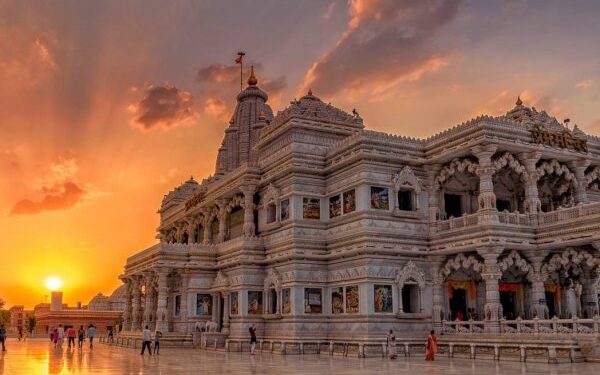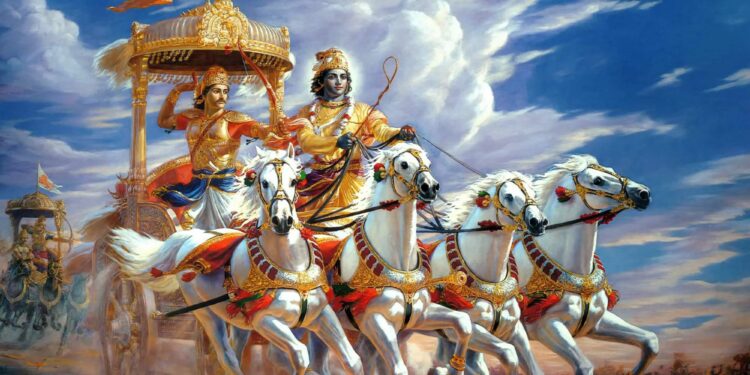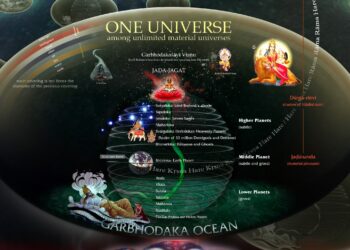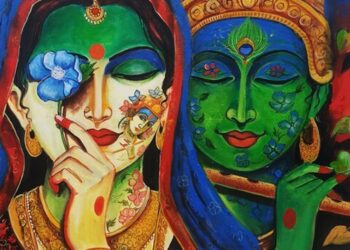Bhagavad-Gita 7.9
puṇyo gandhaḥ pṛthivyāṁ ca
tejaś cāsmi vibhāvasau
jīvanaṁ sarva-bhūteṣu
tapaś cāsmi tapasviṣu
SYNONYMS
puṇyaḥ—original; gandhaḥ—fragrance; pṛthivyām—in the earth; ca—also; tejaḥ—heat; ca—also; asmi—I am; vibhāvasau—in the fire; jīvanam—life; sarva—in all; bhūteṣu—living entities; tapaḥ—penance; ca—also; asmi—I am; tapasviṣu—in those who practice penance.
TRANSLATION
I am the original fragrance of the earth, and I am the heat in fire. I am the life of all that lives, and I am the penances of all ascetics.
PURPORT
Puṇya means that which is not decomposed; puṇya is original. Everything in the material world has a certain flavor or fragrance, as the flavor and fragrance in a flower, or in the earth, in water, in fire, in air, etc. The uncontaminated flavor, the original flavor, which permeates everything, is Kṛṣṇa. Similarly, everything has a particular original taste, and this taste can be changed by the mixture of chemicals. So everything original has some smell, some fragrance, and some taste. Vibhāvasu means fire. Without fire we cannot run factories, we cannot cook, etc., and that fire is Kṛṣṇa. The heat in the fire is Kṛṣṇa. According to Vedic medicine, indigestion is due to a low temperature in the belly. So even for digestion fire is needed. In Kṛṣṇa consciousness we become aware that earth, water, fire, air and every active principle, all chemicals and all material elements are due to Kṛṣṇa. The duration of man’s life is also due to Kṛṣṇa. Therefore by the grace of Kṛṣṇa, man can prolong his life or diminish it. So Kṛṣṇa consciousness is active in every sphere.
Bhagavad-Gita 18.66
sarva-dharmān parityajya
mām ekaṁ śaraṇaṁ vraja
ahaṁ tvāṁ sarva-pāpebhyo
mokṣayiṣyāmi mā śucaḥ
SYNONYMS
sarva-dharmān—all varieties of religion; parityajya—abandoning; mām—unto Me; ekam—only; śaraṇam—for surrender; vraja—go; aham—I; tvām—you; sarva—all; pāpebhyaḥ—from sinful reactions; mokṣayiṣyāmi—will deliver; mā—do not; śucaḥ—worry.
TRANSLATION
Abandon all varieties of religion and just surrender unto Me. I shall deliver you from all sinful reactions. Do not fear.
PURPORT
The Lord has described various kinds of knowledge and processes of religion—knowledge of the Supreme Brahman, knowledge of the Supersoul, knowledge of the different types of orders and statuses of social life, knowledge of the renounced order of life, knowledge of nonattachment, sense and mind control, meditation, etc. He has described in so many ways different types of religion. Now, in summarizing Bhagavad-gītā, the Lord says that Arjuna should give up all the processes that have been explained to him; he should simply surrender to Kṛṣṇa. That surrender will save him from all kinds of sinful reactions, for the Lord personally promises to protect him.
In the Seventh Chapter it was said that only one who has become free from all sinful reactions can take to the worship of Lord Kṛṣṇa. Thus one may think that unless he is free from all sinful reactions he cannot take to the surrendering process. To such doubts it is here said that even if one is not free from all sinful reactions, simply by the process of surrendering to Śrī Kṛṣṇa he is automatically freed. There is no need of strenuous effort to free oneself from sinful reactions. One should unhesitatingly accept Kṛṣṇa as the supreme savior of all living entities. With faith and love, one should surrender unto Him.
The process of surrender to Kṛṣṇa is described in the Hari-bhakti-vilāsa (11.676):
ānukūlyasya saṅkalpaḥ
prātikūlyasya varjanam
rakṣiṣyatīti viśvāso
goptṛtve varaṇaṁ tathā
ātma-nikṣepa-kārpaṇye
ṣaḍ-vidhā śaraṇāgatiḥ
According to the devotional process, one should simply accept such religious principles that will lead ultimately to the devotional service of the Lord. One may perform a particular occupational duty according to his position in the social order, but if by executing his duty one does not come to the point of Kṛṣṇa consciousness, all his activities are in vain. Anything that does not lead to the perfectional stage of Kṛṣṇa consciousness should be avoided. One should be confident that in all circumstances Kṛṣṇa will protect him from all difficulties. There is no need of thinking how one should keep the body and soul together. Kṛṣṇa will see to that. One should always think himself helpless and should consider Kṛṣṇa the only basis for his progress in life. As soon as one seriously engages himself in devotional service to the Lord in full Kṛṣṇa consciousness, at once he becomes freed from all contamination of material nature. There are different processes of religion and purificatory processes by cultivation of knowledge, meditation in the mystic yoga system, etc., but one who surrenders unto Kṛṣṇa does not have to execute so many methods. That simple surrender unto Kṛṣṇa will save him from unnecessarily wasting time. One can thus make all progress at once and be freed from all sinful reactions.
One should be attracted by the beautiful vision of Kṛṣṇa. His name is Kṛṣṇa because He is all-attractive. One who becomes attracted by the beautiful, all-powerful, omnipotent vision of Kṛṣṇa is fortunate. There are different kinds of transcendentalists—some of them are attached to the impersonal Brahman vision, some of them are attracted by the Supersoul feature, etc., but one who is attracted to the personal feature of the Supreme Personality of Godhead, and, above all, one who is attracted by the Supreme Personality of Godhead as Kṛṣṇa Himself, is the most perfect transcendentalist. In other words, devotional service to Kṛṣṇa, in full consciousness, is the most confidential part of knowledge, and this is the essence of the whole Bhagavad-gītā. Karma-yogīs, empiric philosophers, mystics and devotees are all called transcendentalists, but one who is a pure devotee is the best of all. The particular words used here, mā śucaḥ, “Don’t fear, don’t hesitate, don’t worry,” are very significant. One may be perplexed as to how one can give up all kinds of religious forms and simply surrender unto Kṛṣṇa, but such worry is useless.
Srimad Bhagavatam 6.3.19
dharmaṁ tu sākṣād bhagavat-praṇītaṁ
na vai vidur ṛṣayo nāpi devāḥ
na siddha-mukhyā asurā manuṣyāḥ
kuto nu vidyādhara-cāraṇādayaḥ
SYNONYMS
dharmam—real religious principles, or bona fide laws of religion; tu—but; sākṣāt—directly; bhagavat—by the Supreme Personality of Godhead; praṇītam—enacted; na—not; vai—indeed; viduḥ—they know; ṛṣayaḥ—the great ṛṣis such as Bhṛgu; na—not; api—also; devāḥ—the demigods; na—nor; siddha-mukhyāḥ—the chief leaders of Siddhaloka; asurāḥ—the demons; manuṣyāḥ—the inhabitants of Bhūrloka, the human beings; kutaḥ—where; nu—indeed; vidyādhara—the lesser demigods known as Vidyādharas; cāraṇa—the residents of the planets where people are by nature great musicians and singers; ādayaḥ—and so on.
TRANSLATION
Real religious principles are enacted by the Supreme Personality of Godhead. Although fully situated in the mode of goodness, even the great ṛṣis who occupy the topmost planets cannot ascertain the real religious principles, nor can the demigods or the leaders of Siddhaloka, to say nothing of the asuras, ordinary human beings, Vidyādharas and Cāraṇas.
PURPORT
When challenged by the Viṣṇudūtas to describe the principles of religion, the Yamadūtas said, veda-praṇihito dharmaḥ: the religious principles are the principles enacted in the Vedic literature. They did not know, however, that the Vedic literature contains ritualistic ceremonies that are not transcendental, but are meant to keep peace and order among materialistic persons in the material world. Real religious principles are nistraiguṇya, above the three modes of material nature, or transcendental. The Yamadūtas did not know these transcendental religious principles, and therefore when prevented from arresting Ajāmila they were surprised. Materialistic persons who attach all their faith to the Vedic rituals are described in Bhagavad-gītā (2.42), wherein Kṛṣṇa says, veda-vāda-ratāḥ pārtha nānyad astīti vādinaḥ: the supposed followers of the Vedas say that there is nothing beyond the Vedic ceremonies. Indeed, there is a group of men in India who are very fond of the Vedic rituals, not understanding the meaning of these rituals, which are intended to elevate one gradually to the transcendental platform of knowing Kṛṣṇa (vedaiś ca sarvair aham eva vedyaḥ [Bg. 15.15]). Those who do not know this principle but who simply attach their faith to the Vedic rituals are called veda-vāda-ratāḥ.
Herein it is stated that the real religious principle is that which is given by the Supreme Personality of Godhead. That principle is stated in Bhagavad-gītā. Sarva-dharmān parityajya mām ekaṁ śaraṇaṁ vraja: [Bg. 18.66] one should give up all other duties and surrender unto the lotus feet of Kṛṣṇa. That is the real religious principle everyone should follow. Even though one follows Vedic scriptures, one may not know this transcendental principle, for it is not known to everyone. To say nothing of human beings, even the demigods in the upper planetary systems are unaware of it. This transcendental religious principle must be understood from the Supreme Personality of Godhead directly or from His special representative, as stated in the next verses.



















